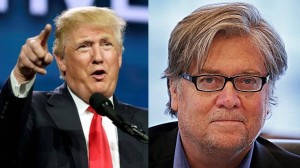Psychoanalyst Erich Fromm wrote in 1941 how individual freedom may invite feelings of isolation, powerlessness, and hopelessness, so strongly that one sacrifices individual freedom for authority and submission, to avoid the uncertainty of freedom, at the cost of independent thought.
Virginia Senator James Webb charged that there exists a compensation chasm between what largesse the billionaire “job creators” harvest and how much the “workers” earn.
This greed has created isolation and hopelessness among many working Americans.
Ironically, a Billionaire, realtor Donald Trump, gave “workers” hope though Mr. Trump has appointed no one since his inauguration to represent the workers.
Mr. Trump’s program “guarantees” that America will be first, will reconsider our nation’s relationship with its long-time NATO allies, will build a wall along the Mexican border, encourage nation states to join the exclusive nuclear club, and will favor Russian President Vladimir Putin, who overran and occupied Crimea with military force.
Mr. Trump is indisputably authoritarian, surrounded by radical right wing acolytes, all in a rush to rule, and to overrun any one critical of his chaotic impulses.
By way of example, Mr. Trump late one Friday night executed a Muslim ban against documented immigrants from seven mostly Muslim states who had already been “extremely vetted.”
Mr. Trump broke his sworn oath of office to uphold the constitution as confirmed by several federal courts, finding his executive order was unconstitutional; Mr. Trump bragged he’d appeal; he has not.
The paramount conflict that most drives Mr. Trump’s tweeting campaign against the press are inquiries and reports about what and when Mr. Trump had communications, directly or indirectly, with Russian officials including Mr. Putin, having to do with Russia’s interference in our nation’s presidential election.
It is also the subject of ongoing investigations whether Russia has compiled embarrassing financial and personal tapes or records that compromise Mr. Trump’s personal reputation and fortune, and that might affect Mr. Trump’s loyalty to preserve and protect our nation’s best interests.
The FBI has been investigating “Kremlingate” in its various evolving parts.
The U.S. Senate and the House Intelligence Committees have announced investigations as well.
Rep. Darrell Issa (R-CA), a member of the House Judiciary Committee, has called for a Special Prosecutor to investigate Russia’s alleged interference, especially given that Attorney General Sessions has an irreconcilable conflict and apparent bias as a past member of Mr. Trump’s campaign and as his nominee.
Mr. Trump has insisted the press was “the enemy of the people” for reporting on Mr. Trump’s constitutionally flawed Muslim ban, the forced resignation of his NSC Adviser, Michael Flynn, and the status of the various investigations of Russian interference in our election.
Mr. Trump is not the first Chief Executive to confuse reporting of his bad acts as, somehow, an attack against “the people.”
Of course, the very words Trump used, “the enemy of the people,” are the signature claims of past authoritarians from Robespierre to Hitler, to Lenin, and Stalin.
Last Friday, Mr. Trump told the Conservative Political Action Conference (CPAC) what he thought about the press – “They’re very smart, they’re very cunning and they’re very dishonest.”
Later that very day, after bashing the press once again, the White House barred from a press briefing several new organizations singled out as his disagreeables including the Daily News, CNN, the New York Times, the Los Angeles Times, the Hill, Politico, RealClear Politics and BBC.
The Supreme Court has applied a First Amendment test justifying access to government process called the “logic and experience test.” The test considers “whether the place and process have historically been open to the press and general public,” like a press briefing, or gaggle, and “whether public access plays a significant positive role in the functioning of the particular process in question,” such as informing the public. The case is Press-Enterprise Co. v. Superior Court (Press-Enterprise II).
In addition, in Richmond Newspapers, Inc. v. Virginia, the Court found that the First Amendment played a structural role in requiring an open government, and guaranteed the press and public a right of access to the government.
There may be an even stronger argument here because the West Wing allowed some access and others not, that the Administration chose “friendlies,” and excluded the disagreeables, rewarding and punishing news organizations, based on what they reported, and that’s censorship, that’s chilling First Amendment exertions and that violates the constitutional guarantee of equal protection under the law.
A free press is essential to an open and fair government; our government is at risk and drifting, if not rushing, toward despotism.

